Ethnographer, Society, and Art: Symbiosis of Ethnology and Art and Discourse of the Soviet Colonialism in Latvia
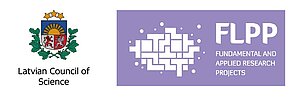
Project No.: lzp-2023/1-0052
Implementation period: 01.01.2024.–31.12.2026.
Project costs: EUR 300 000. 00
Project leader: Dr. hist. Anete Karlsone
For the first time since the restoration of independence, the implementation of the project will provide a scientific evaluation of the field of ethnology during the Soviet period and promote public understanding of the system of knowledge formation, dissemination and control implemented in the Soviet totalitarian regime, as well as the role of ethnography and art in uniting society and creating a common identity.
By researching archival documents and other written sources of history, combined with interviews of Soviet period eyewitnesses and respondents of younger generations, the creation of ethnological knowledge and its use both for the purposes of Soviet ideology and as a resource for strengthening national identity under colonialism will be investigated.
The project's activities will contribute to the public's understanding of the impact of the Soviet colonial policy on the system of knowledge creation and control, as well as the role of ethnography and art in uniting society and creating a common identity. In the implementation of the project, the cooperation partner of LU LVI is the Latvian Academy of Arts.
Researchers from the Latvian Institute of History of the University of Latvia have joined the project group: Dr. hist. Anete Karlsone, Dr. hist. Ilze Boldāne-Zeļenkova, Dr. art. Ieva Pīgozne, Dr. hist. Daina Bleiere and Ilze Ulmane, custodian of the collection, as well as cooperation partners from LMA: Dr.art. Inese Sirica, Dr. art. Jānis Kalnačs, doctoral student Una Valtere and master's student Santa Sleikša.
Pētnieciskais darbs:
Projekta dalībnieki turpināja strādāt pie savu pētniecisko tēmu izstrādes, vācot materiālus krātuvēs (LNA Latvijas Valsts arhīvā (LVI fonds) un Latvijas Valsts vēstures arhīvā (LU un LMA fondi); LZA arhīvā (Prezidijs, Sabiedrisko zinātņu nodaļa); LMA informācijas centrā; LU HZN LVI Etnogrāfisko materiāli krātuvē (E67 fonds); LNB (D.Zemzares fonds) u. c.) un strādājot ar zinātnisko literatūru, kā arī veicot intervijas.
Dalība konferencēs:
2024. gada 7. novembrī Una Valtere piedalījās Latvijas Kultūras akadēmijas organizētās konferenču sērijas Kultūras Krustpunkti XVIII sekcijā: “Kultūras mantojums: aktuālie jaunatklājumi un jaunatklātās aktualitātes” ar referātu: "Izšūtās vīriešu jostas (zīļu jostas) Baltijas tautu vēsturiski etnogrāfiskajā Atlantā: tradicionālā apģērba piederuma pētniecības piemērs Latvijā, Lietuvā un Igaunijā".
2024. gada 5.–6. decembrī Daina Bleiere ar referātu “Making Latvian Ethnography Soviet (1940-1950)” piedalījās starptautiskā zinātnieku konferencē: “13th Vilnius Symposium on Late Soviet and Post-Soviet Issues “Inclusive and/or Alienating Political Power. Tsarist and Soviet Rule on the Western Peripheries””.
Iesniegts raksts:
Boldāne-Zeļenka, Ilze. No centra uz perifēriju un atpakaļ? Latviešu padomju etnogrāfu publikācijas izdevumā “Sovetskaja Etnografija” /From the center to the periphery... and back? The input of the Latvian Soviet Ethnographers to the Issue "Sovetskaja Etnografija". In: LU žurnāls Vēsture (Scopus), plānots publicēt 2025. gadā.
Konferences organizēšana:
Daina Bleiere sagatavoja paneļa “Ethnography as Inspiration and as Political Instrument: Divergent Aspects and Applications of Ethnographical Knowledge in Soviet Latvia” pieteikumu, kurš tika akceptēts Baltijas studiju (CBSE) 16. konferencei Eiropā “Converging Paths: The Baltic Between East and West“, Kembridžā (Apvienotā Karaliste) 2025. gada 24.–26. aprīlī. Panelī iekļauti I. Boldānes-Zeļenkas, J. Kalnača, A. Karlsones, I. Siricas, U. Valteres un S. Sleikšas referāti.
Meistardarbnīca:
2024. gada 12. decembrī norisinājās projektā plānotā meistardarbnīca: “Mākslas un etnogrāfijas simbioze: LMA pētnieku jaunākās atziņas”. Tajā izskanēja priekšlasījumi:
Jānis Kalnačs "Latviešu tautas mākslas kurss Valsts mākslas akadēmijā. Gundegas Ivanovas laiks".
Una Valtere un Santa Sleikša “Mākslas un etnogrāfijas simbioze: Atziņas no Keramikas un Tekstilmākslas katedru absolventu diplomdarbu datu bāzes digitalizācijas”.
Sabiedrības informēšana:
2024. gada otrajā pusgadā sagatavoti un publiskoti deviņi ieraksti projekta lapā vietnē Facebook.
- The article submitted for publication and is in the review process: A. Karlsone "Researcher between political ideology and personal professional interests: ethnology in Soviet Latvia". Studia Fennica Ethnologica: Ethnological Knowledge Production in Post-War Europe: Political Ideologies and the Intellectual History of European Ethnology.
- Organized and conducted the section of the 82nd international conference of the UL "Ethnographer, society, art, 1940-1990. Ethnographer, Society, and Art, 1940–1990”. In it, 15 papers were read, the authors of which represented the scientific institutions of 4 countries: University of Latvia, Latvian Academy of Arts, Riga Stradins University School of Economics and Culture, Lithuanian Institute of History, Vytautas Diža University, University of Tartu, National Museum of Estonia, Jasi Aleksandar Ioana Kuza University (Romania ) and the Institute of Folklore and Ethnology of the Romanian Academy.
- Electronically published collection of theses The 82nd International Scientific Conference of the University of Latvia session "Ethnographer, Society, and Art, 1940–1990" Abstracts. Composed by Ilze Boldāne-Zeļenkova, Riga: UL. ISBN: 978-9934-8505-9-2. Available in the UL Repository.
- Theses of the papers read at the conferences have been published:
- Santa Sleikša. (2024) Sprēslīcas 20. gs 40.–80. gadu etnogrāfisko ekspedīciju liecībās Latvijas Universitātes Latvijas vēstures institūta Etnogrāfisko materiālu krātuvē. LMA XII Maģistrantu zinātniskā konference. Referātu tēzes. Sastād. Silvija Grosa, Rīga: LMA,12.–13.lpp. ISBN: 978-9934-630-16-3
- Daina Bleiere (2024) Etnogrāfijas sovetizācijas pirmie soļi (1940–1941, 1944–1946). Etnogrāfs, sabiedrība, māksla, 1940–1990: LU 82. starptautiskās zinātniskās konferences sekcijas tēzes, 2024. gada 22. marts. The 82nd International Scientific Conference of the University of Latvia session “Ethnographer, Society, and Art, 1940–1990” Abstracts. Sastād. Ilze Boldāne-Zeļenkova, Rīga: LU, 7.lpp. ISBN: 978-9934-8505-9-2
- Daina Bleiere (2024) The First Steps in Sovietization of Ethnography (1940–1941, 1944–1946) Etnogrāfs, sabiedrība, māksla, 1940–1990: LU 82. starptautiskās zinātniskās konferences sekcijas tēzes, 2024. gada 22. marts. The 82nd International Scientific Conference of the University of Latvia session “Ethnographer, Society, and Art, 1940–1990” Abstracts. Sastād. Ilze Boldāne-Zeļenkova, Rīga: LU, 8.lpp. ISBN: 978-9934-8505-9-2
- Ilze Boldāne-Zeļenkova (2024) No centra uz perifēriju un atpakaļ: latviešu (padomju) etnogrāfija izdevumā “Sovetskaia Etnografia”. Etnogrāfs, sabiedrība, māksla, 1940–1990: LU 82. starptautiskās zinātniskās konferences sekcijas tēzes, 2024. gada 22. marts. The 82nd International Scientific Conference of the University of Latvia session “Ethnographer, Society, and Art, 1940–1990” Abstracts. Sastād. Ilze Boldāne-Zeļenkova, Rīga: LU, 9.lpp. ISBN: 978-9934-8505-9-2
- Ilze Boldāne-Zeļenkova (2024) From the Centre to the Periphery and Back. Latvian (Soviet) Ethnography in the Journal “Sovetskaya Etnografia”. Etnogrāfs, sabiedrība, māksla, 1940–1990: LU 82. starptautiskās zinātniskās konferences sekcijas tēzes, 2024. gada 22. marts. The 82nd International Scientific Conference of the University of Latvia session “Ethnographer, Society, and Art, 1940–1990” Abstracts. Sastād. Ilze Boldāne-Zeļenkova, Rīga: LU, 10.lpp. ISBN: 978-9934-8505-9-2
- Jānis Kalnačs (2024) Vispārējās etnogrāfijas un latviešu tautas mākslas kursi LVU Filoloģijas fakultātes Mākslas zinātņu nodaļas programmā. Etnogrāfs, sabiedrība, māksla, 1940–1990: LU 82. starptautiskās zinātniskās konferences sekcijas tēzes, 2024. gada 22. marts. The 82nd International Scientific Conference of the University of Latvia session “Ethnographer, Society, and Art, 1940–1990” Abstracts. Sastād. Ilze Boldāne-Zeļenkova, Rīga: LU, 15.lpp. ISBN: 978-9934-8505-9-2
- Jānis Kalnačs (2024) Ethnography and Latvian Folk Art in the Curriculum of the Art History Department of the Faculty of Philology at the State University of Latvia. Etnogrāfs, sabiedrība, māksla, 1940–1990: LU 82. starptautiskās zinātniskās konferences sekcijas tēzes, 2024. gada 22. marts. The 82nd International Scientific Conference of the University of Latvia session “Ethnographer, Society, and Art, 1940–1990” Abstracts. Sastād. Ilze Boldāne-Zeļenkova, Rīga: LU, 16.lpp. ISBN: 978-9934-8505-9-2
- Anete Karlsone (2024) Anna Krastiņa. Etnogrāfe Padomju Latvijā: iespējas, ierobežojumi un sasniegumi. Etnogrāfs, sabiedrība, māksla, 1940–1990: LU 82. starptautiskās zinātniskās konferences sekcijas tēzes, 2024. gada 22. marts. The 82nd International Scientific Conference of the University of Latvia session “Ethnographer, Society, and Art, 1940–1990” Abstracts. Sastād. Ilze Boldāne-Zeļenkova, Rīga: LU, 17. lpp. ISBN: 978-9934-8505-9-2
- Anete Karlsone (2024) Anna Krastiņa. Ethnographer in Soviet Latvia: Opportunities, Limitations, and Achievements. Etnogrāfs, sabiedrība, māksla, 1940–1990: LU 82. starptautiskās zinātniskās konferences sekcijas tēzes, 2024. gada 22. marts. The 82nd International Scientific Conference of the University of Latvia session “Ethnographer, Society, and Art, 1940–1990” Abstracts. Sastād. Ilze Boldāne-Zeļenkova, Rīga: LU, 18. lpp. ISBN: 978-9934-8505-9-2
- Project participants have participated in four international conferences:
- January 19, 2024 AAL XII Master's Students Scientific Conference (S. Sleikša)
- March 15, 2024, the section of the 82nd international scientific conference of the University of Latvia, "History of clothing in Latvia". (U. Valtere)
- March 22, 2024, the section of the 82nd international scientific conference of UL "Ethnographer, society, art, 1940–1990. Ethnographer, Society, and Art, 1940–1990" (D.Bleiere, I.Boldāne-Zeļenkova, A.Karlsone, J.Kalnačs)
- May 16, 2024 Vilnius University Šiauliai Academy International Conference The Region: History, Culture, Language (I. Pīgozne)
- Master's thesis defended. On June 10, 2024, AAL student Santa Sleikša, a member of the project cooperation partner's working group, defended her master's thesis "The Ornament of the "sprēslīcas" and Regional Differences in the Context of the History and Museumization of Latvian Ethnology in Latvia 19th century—20th century," obtaining an Mg.art. scientific degree.
To outline the framework of the researched topic, we invited researchers and students of humanities and social sciences whose interests include the history of the branches of science related to the ethnography, daily life, or artistic developments during the Soviet occupation period, to the conference section "Ethnographer, Society, Art: 1940–1990" by submitting reports related to any of the following topics:
- The political, administrative and legal regulation affecting the development of the field of ethnography;
- Creation of ethnological knowledge and its use for the purposes of Soviet ideology;
- Ethnological knowledge as a resource for strengthening national identity under colonialism;
- Points of contact between ethnography, archaeology, folkloristics, and other fields of science during the Soviet occupation period;
- The symbiosis of ethnographic cultural heritage and art;
- Ethnographic cultural heritage and its use in education during the Soviet occupation period.
The authors of the 15 reports read at the conference were scientists from the Latvian Institute of History of the University of Latvia, Art Academy of Latvia, Rīga Stradiņš University, EKA University of applied sciences, Lithuanian Institute of History, Vytautas Magnus University, University of Tartu, Estonian National Museum, Alexandru Ioan Cuza University of IASI and “Constantin Brăiloiu” Institute of Ethnography and Folklore of the Romanian Academy.
On 24–26 April 2025, the 16th European Conference on Baltic Studies, titled "Converging Paths: The Baltic between East and West," took place in Cambridge, United Kingdom. Participants in the project "Ethnographer, Society, Art: The Symbiosis of Ethnology and Art and the Discourse of Soviet Colonialism in Latvia" (lzp-2023/1-0052) also contributed, leading their own distinct panel titled "Ethnography as inspiration and as political instrument: divergent aspects and applications of ethnographical knowledge in Soviet Latvia," as well as participating in other panels. The project panel was led by Dr. hist. Vida Savoniakaite, the leading researcher of the Lithuanian Institute of History. Four project participants presented their research at this panel. Ilze Boldāne-Zeļenka (UL FH ILH) presented a paper titled "Between Soviet building regulations and national tradition: the subject of construction in the Latvian SSR ethnography." Anete Karlsone (UL FH ILH) presented "Power, Ethnographer, and Society in Soviet Latvia: Scientific Report Sessions 1957–1989." Inese Sirica (LAA) shared her paper "Visualization of the Concept of Latvian Folk Art Under Soviet Occupation: The Case of State Art Academy Graduation Projects," while Jānis Kalnačs (LAA) presented "Teaching History of Latvian Folk Art in the State Academy of Art: Secondary Subject of National Culture in Soviet-period Curriculum." Additionally, Una Valtere (LAA), a doctoral candidate involved in the project, presented her paper "Comparative analysis of material evidence and research approaches in the study of embroidered men's belts (bead belts) of the 19th and early 20th centuries in Latvia, Lithuania, and Estonia" at the panel "New avenues in Baltic ethnography and folklore studies."
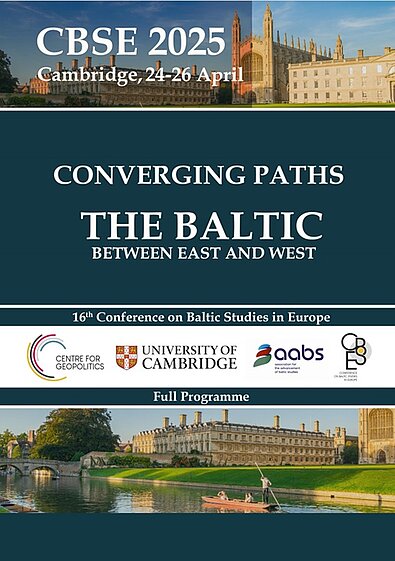
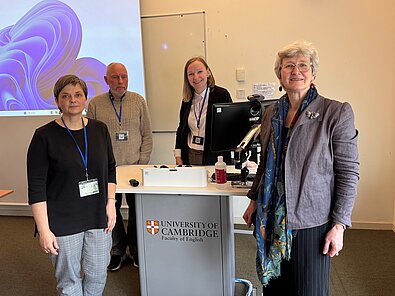
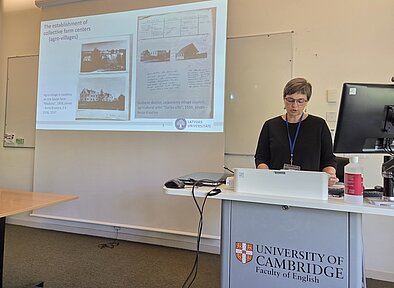
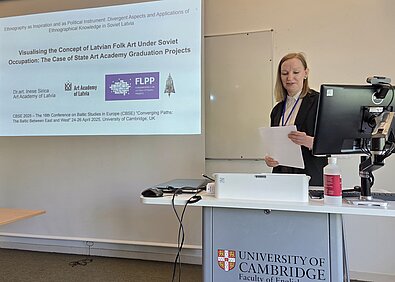
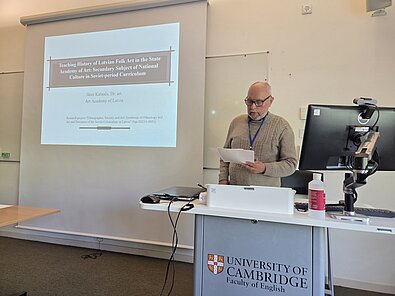
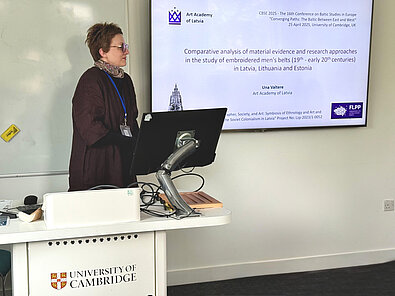
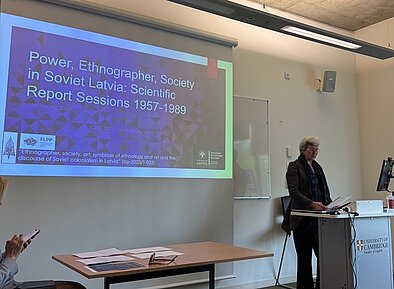
- Navigating the Latvian History of the 20th–21st Century
- Expanding Concept and Methodology for Human Past Studies
- Ethnographer, Society, and Art
- The environment and early farming
- Viking Age in Latvia: an interdisciplinary study
- Burial practices in the landscape
- Skills in synergy, crafts in context
- Dyes and Dyeing
- Magic and Superstition
- Knots in Clay
- Contextualization of Traditional Clothing

 CONFERENCE
CONFERENCE